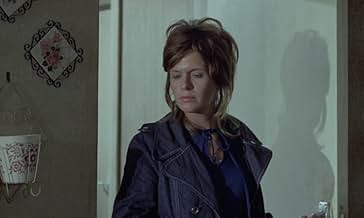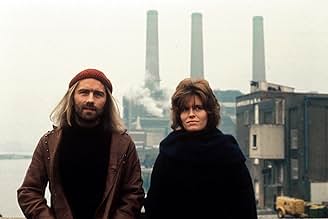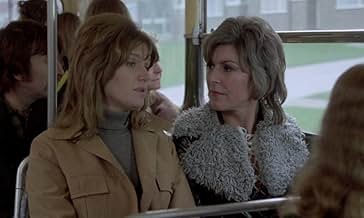Ajouter une intrigue dans votre langueThe story of the relationship between a young single mother and an insecure rock star.The story of the relationship between a young single mother and an insecure rock star.The story of the relationship between a young single mother and an insecure rock star.
Avis à la une
My take on the meaning is to link the title to the melancholy lyric of a song played near the end, "too late to create a world with care", that is, the world is already made, Pandora's box is already opened never to be closed again (recognising the irony of using the term in a review of a feminist or at least superficially feminist film).
The film is often marketed as being about an affair between a housewife and a rock star, however Valerie is more of a working mum, and there are three men in the movie with designs on her. Pop star Mike Preston is outwardly charming and modern, but really this charm is a teflon shield he holds in front of his sophistry, Father Dyson is the local priest who abuses his position of trust to woo Valerie, whilst Mahdav is an Indian immigrant who is university educated and the boss at the switchboard where Valerie works.
Each of these men are deconstructed. Father Dyson and Mike Preston are shown as equivalents (after being set up as opposite poles) in staggering scenes where they feed off of Valerie's grief, Father Dyson for a sermon, and Mike Preston for his sermon equivalent, a pop song. Dyson records his sermon and sits in a church listening to himself on playback, whilst Preston does the same in a recording studio. I think there's an idea here that men are systematisers, expanding their observations into grandiose theories, going from the specific to the general, whereas women understand people on a case-by-case basis. To quote from Dworkin myself: "While gossip among women is universally ridiculed as low and trivial, gossip among men, especially if it is about women, is called theory, or idea, or fact."
Mahdav is a fantasist who interprets a roll in the sack with Valerie as meaning she wants to marry him, he treats her as an object of veneration. He's deeply insensitive, and, like Preston, uses her grief as an opportunity to get closer to her.
Maybe the film is about how confused people become by their own ideologies. I know a young lady who quite confidently told me that a man's weight is not important in terms of attractiveness (the ideology), a couple of weeks later she is telling me of her alarm that her boyfriend is putting on weight, and her action plan to sort that out (the practise). The programmer of the festival, having quoted Dworkin, then complained about the director's lack of chivalry in revealing that he had slept with actress Carole Barker on set (chivalry being an opposite concept based on the concept of the weakness of women). People take themselves very seriously, I for example am sat here re-reading what I have been writing, using the movie as fodder for my sermon.
The movie becomes a Satan's Brew in the end, none of the characters end up being likable, and the film pines for the playground, which is supposedly a pure state, a quite iconic black and white shot of an iron maypole with chains dangling down and coming to a halt symbolises this. I don't think you can call Valerie a heroine either, once you've got past her beauty (something that the men in the film can't do) she is quite cynical, "I don't think people are that lovable really", and simple. Ah what a wicked wicked film.
Apparently the inspiration for the movie is the Beatles' song Eleanor Rigby ("All the lonely people/Where do they all come from?"). One of the lyrics is pretty reflexive for the film, given the director's own name (Mackenzie), "Father McKenzie writing the words of a sermon that no one will hear", especially as this film remains little known and the programmers had to instigate a dig around in the archives at the distributor to even find a copy.
Just to note that it's very well shot at all times, in particular there's a montage of baby items that is quite staggering, won't spoil the context.
Football back then was very much as shown in this film. It just seems light years away from today Well as to the film it seems like a reprise of Poor Cow,a film which Carol White didn't mention in her autobiography.
She was clearly a very vunerable person who died tragically young. Appearing in films like this was not going to get her career restarted. As for Roy Harper the less said the better.
So whether, or how much, you like this film might depend on how much you are "into" Roy Harper. And also whether, or how much, you liked the early 70′s (assuming you're old enough to have memories of it)
Carol White (as Valerie) seems to be doing a reprise of her role in Cathy Come Home: working class girl pushing a pram around looking for escape – relief, pleasure, ordinary happiness – from a small bleak life; getting hit on by various blokes, who leech off her grief: Roy "makes" a song out of it; a do-gooding vicar makes a sermon; and a hapless Asian from work makes a twatty poem.
Roy Harper comes across as earnest rather than endearing – something you could say about the film in general. The nitty isn't gritty or politically engaged enough to be Ken Loach; the characterisations aren't idiosyncratic enough to be Mike Leigh. It's all a bit, well – as well-intentioned, but as dull as a Roy Harper dirge about old Englande (where old cricketers are leaving the crease or dying of boredom or something)
"Do you think a girl should go to bed with a fella if he doesn't love her?" asks Carol." "No. Unless it's me" quips Roy. Before long he's abandoned her to carry on with his free love mystical hippy beardy rock star thang (although he's written that song about her. Which she turns off. Well done Carol)
"Is it too late to create a world made of care" sings Roy at the end. Yes it is. And even though Made tries to be a film made of care – touched with caring sort of sentiments – in the end it just ends up feeling care-worn; and made (as in "manufactured") in the 1970′s film factory Social Conscience School for bleak and cheerless cliché.
Le saviez-vous
- AnecdotesAccording to Roy Harper other candidates who auditioned for the lead role were Marc Bolan, Kris Kristofferson and Tony Joe White.
- Citations
Valerie Marshall: You're educated aren't you?
Mahdav: How could you tell?
Valerie Marshall: Oh, I think you can always tell. Our teacher at school said you can always tell an educated man.
Mahdav: How? Do let me know. How does it show?
Valerie Marshall: I dunno... it's ehm... it's a sort of gentle.
Mahdav: A man of the Orient is naturally gentle, yet passionate too. He is both a tranquil stream and a raging torrent.
Valerie Marshall: That's good. I like that.
[pause]
Valerie Marshall: Well, I think I better be going now.
Mahdav: Valerie, we have so much in common, you and I. We're both in need.
Valerie Marshall: In need?
Mahdav: May I tell you that... I find you beautiful?
Valerie Marshall: Not really.
Mahdav: Then let my eyes speak for me. Aren't they eloquent? Look into my eyes. Go on - look. What do you see?
Valerie Marshall: Well, your pupils... they're eh, a bit big.
Mahdav: They are dark pools. They reflect your beauty.
Valerie Marshall: [she laughs]
- Bandes originalesBank Of The Dead (Valerie's Song)
Written by Roy Harper
Produced by Peter Jenner
Performed by Roy Harper
Meilleurs choix
Détails
Contribuer à cette page































